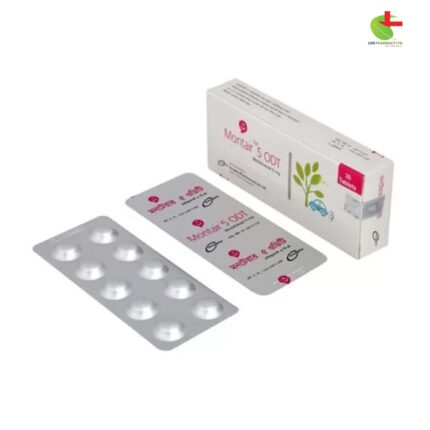“Bufocort 200” has been added to your basket. View basket
Ivolol 2.5
70.00৳ Strip
- Nebivolol is a selective beta-blocker used for the treatment of hypertension and heart failure.
- It works by blocking beta-1 receptors and promoting vasodilation through nitric oxide release.
- Commonly prescribed to reduce blood pressure and improve heart function in patients with cardiovascular conditions.
- Well-tolerated with a low risk of side effects, but should be used cautiously in patients with certain medical conditions.
 Brand
Brand
|
Incepta Pharmaceuticals Ltd |
|---|---|
 Generics
Generics
|
Nebivolol |
 Type
Type
|
Tablet |
0
People watching this product now!
Description
Indications:
- Heart Failure
- Hypertension (High Blood Pressure)
Administration:
- Can be taken with or without food for convenience.
Adult Dosage:
For Hypertension:
- Starting Dose: 5 mg once daily.
- Maintenance Dose: Can increase to a maximum of 40 mg daily, depending on the patient’s needs, with dose adjustments made at 2-week intervals.
For Elderly Patients (over 65 years):
- Starting Dose: 2.5 mg once daily, increasing to 5 mg once daily if needed.
For Heart Failure:
- Starting Dose: 1.25 mg once daily.
- Maintenance: Can double the dose every 1-2 weeks if well tolerated. The maximum dose is 10 mg once daily.
In Case of Hepatic Impairment:
- Start with 2.5 mg per day, and increase cautiously under medical supervision.
Renal Impairment Dosage:
- For Creatinine Clearance (CrCl) < 30 mL/min: Start with 2.5 mg once daily. The dose may be increased to 5 mg daily if required.
Contraindications:
- Hepatic Impairment
- Sick Sinus Syndrome
- Second and Third-Degree Heart Block (unless using a pacemaker)
- History of Asthma
- Metabolic Acidosis
- Severe Peripheral Arterial Disease
- Severe Bradycardia
- Cardiogenic Shock or Decompensated Heart Failure
- Untreated Pheochromocytoma
- Pregnancy and Lactation (not recommended)
Mode of Action:
- Nebivolol selectively blocks beta-1 adrenergic receptors and promotes vasodilation through nitric oxide release from the endothelium. Unlike other beta-blockers, it does not have intrinsic sympathomimetic activity or membrane-stabilizing effects.
Precautions:
- Caution in patients with:
- Inadequate cardiac function
- Well-compensated heart failure
- Myasthenia Gravis
- Major surgery with general anesthesia
- Potential risks:
- May mask symptoms of hypoglycemia and hyperthyroidism.
- Abrupt discontinuation can worsen angina, and may precipitate myocardial infarction (MI) and ventricular arrhythmias, especially in patients with coronary artery disease.
- Monitoring:
- Regularly monitor ECG, blood pressure, and blood glucose in diabetic patients.
- Pregnancy & Lactation:
- Not recommended during pregnancy and lactation as safety is not established.
Side Effects:
- Common (1-10%):
- Headache (6-9%), Fatigue (2-5%), Dizziness (2-4%), Diarrhea (2-3%), Nausea (1-3%), Increased triglyceride levels and insulin resistance, Decreased HDL levels (1%), Insomnia (1%), Peripheral edema (1%), Weakness (1%)
- Less Common (<1%):
- Bradycardia, Chest pain, Dyspnea, Anaphylaxis (potentially fatal)
Drug Interactions:
- Increased plasma concentration with potent CYP2D6 inhibitors (e.g., paroxetine, fluoxetine, propafenone, thioridazine, quinidine).
- Concomitant use with antiarrhythmic drugs (e.g., amiodarone, disopyramide) or nondihydropyridine calcium channel blockers (e.g., diltiazem, verapamil) may cause conduction disturbances.
- Additive effects on AV conduction and heart rate when used with other beta-blockers or digoxin.
- Hypotension or bradycardia may occur when used with catecholamine-depleting agents (e.g., reserpine).
- Abrupt clonidine withdrawal may increase the risk of rebound hypertension.
Reviews (0)
Be the first to review “Ivolol 2.5” Cancel reply
About brand
Shipping & Delivery













Reviews
There are no reviews yet.